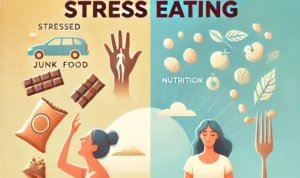Table of Contents
ToggleAre carbs resulting in weight gain and blood glucose spikes instead of benefits? This might just be about having the wrong timings. The right timing to eat carbohydrates depends on the intended outcomes, but generally, morning is taken to be the best time to eat carbohydrates. Do not miss out on this, one of the three key macronutrients, because of the wrong notions. Book a consultation with a nutritionist now to know how much of the carbs are exactly suitable for you and the best time to consume them.
What are Carbohydrates | Are They Unhealthy?
Carbohydrates, sometimes simply called carbs, are one of the three most important macronutrients needed by humans, along with proteins and fats. The term carbohydrate has always been cursed in the diet given to people since time immemorial as if it were injurious to health. It is certainly not. Carbs are important for the body as they constitute the body’s principal source of energy, especially for the brain and muscles.
They are part of many foods, including fruits, vegetables, grains, and dairy products. The key is choosing the right type of carbohydrates and eating them in appropriate portions at the right time.
There are two major types of carbohydrates:
- Simple sugars: Taken from fruit, milk, and sugar-sweetened drinks.
- Complex Carbs: Found in whole grains, legumes, and vegetables.
| Point to Ponder: 1 gram of carbohydrates provides four calories. They are avoided during the ketogenic diet to lose the fat depositions and let the body burn its stored resources. |
What Time is the Best to Eat Carbohydrates?
The best time to eat carbs is in the morning. Generally, the body is more sensitive to insulin during the satrt of the day; therefore, that is when it would process the carbohydrates most effectively into energy and not store them as fat. Eating carbs in the morning is important because it follows your natural metabolic rhythm, supports stable blood sugar, and healthy metabolism through the day. This approach should be particularly helpful for weight loss or overall metabolic health.
Morning is also the time of day to eat complex carbohydrates like oats, whole grains, and vegetables. Waking up with a complex carbohydrate source sets your blood sugar levels in motion throughout the morning, providing all necessary energy.
| Foody Tip: Apples are the best when eaten in the morning as well, so why not try an apple pie for breakfast? |
Simple Carbs for Pre-Workout
The best time to consume simple carbs is 1-3 hours before exercise. This could be fruits, honey, or even one slice of whole-grain toast. These are broken down quickly and give an immediate energy source in the bloodstream.
This translates to boosting your energy levels to cope better with high-intensity or endurance activity. This could also be mixed with a little protein to further better performance through muscle function support during exercise.
Recovery Post Workout with Carbohydrates
Post-exercise, one would wish to restore the body’s glycogen stores to be able to recover the muscles. This post-workout occasion meal should include such food sources as brown rice, sweet potato, or whole-grain bread that are rich in complex carbohydrates within one hour of exercise.
This replaces lost energy and restores the repair process in the musculature system. These types of carbs digest at a slightly slower rate, release their energy slowly, and help optimize recovery. Pair them with protein to further aid in muscle repair and growth.
When to Eat Carbs for Weight Loss
Studies suggest that eating carbohydrates for weight loss in the morning can have significant health benefits. Favor complex carbs during the morning for weight loss to create maximal energy and high levels of fat burning.
Later into the day, taper carb intake and avoid significant consumption towards the later hours. This will help avoid unnecessary calorie storage and support weight loss efforts. In the meanwhile, avoid simple processed carbs that can lead to peaks in blood sugar and cravings.
Eating Carbohydrates Before Bed
The evening and night are considered the worst time to eat carbohydrates due to the slowed-down digestion. This can lead to digestive issues such as indigestion, flatulence, and heartburn.
Other studies suggest that eating carb-rich dinners takes our body to the parasympathetic mode, relaxing the mind and facilitating sleep.
That being mentioned, moderation is always recommended to avoid gaining pounds or digestive issues.
Special Considerations: Carb-Timing Adjustments to Suit Your Goals
Because individual needs vary, you can adjust your carb timing for your specific goals and lifestyle. Endurance athletes will benefit more when they take in carbs during extended exercise to keep their energy high.
Persons with insulin resistance or diabetes should take a good, hard look at when and how many carbs they eat and focus the majority of them when the body is most receptive—in the morning or post-activity. A nutritionist’s recommendation can be beneficial in this regard.
How Many Carbs a Day Are Ideal?
The recommended intake of carbohydrates for an individual varies on age, sex, level of physical activity, and health status. Carbohydrates are typically needed to constitute 45-65% of total daily caloric intake.
For someone eating 2,000 calories a day, that’s 225 to 325 grams of carbs. These figures can, however, be played with based on individual requirements or goals of losing weight, building muscle, or maintaining blood sugar.
Conclusion
Carbohydrates provide energy that is key to a balanced diet, and timing when you eat can have tremendous effects on your energy level, workout performance, and health. You can really supercharge health—be it losing weight, gaining better muscle recovery, or wanting to maintain even energy through the day—by strategically timing carb intake around daily activities, such as workouts or routines, focusing on the right kind of carbs.
FAQs
What is the best time to eat carbs for muscle growth?
To gain strength, performance, and muscle mass, consume 8 to 10 grams of carbohydrates per kilogram of lean body weight daily. Eat an adequate carbohydrate serving at least one hour before resistance training, immediately after exercise, and again two to three hours after weightlifting.
What is the worst time to eat carbs?
Avoid taking carbohydrates in the evening or at night as the digestion process slows down and the consumed calories can result in fat buildup.






